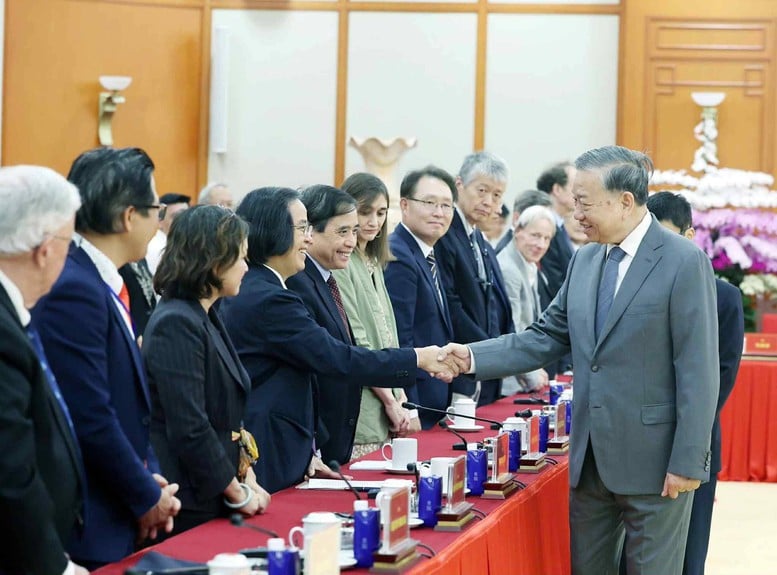
General Secretary To Lam receives delegates of the 7th International Conference on Vietnamese Studies - Photo: VNA
Professor Tran Van Tho (Waseda University, Tokyo, Japan) recently attended the 7th International Conference on Vietnamese Studies with the theme "Vietnam: Sustainable Development in the New Era" in Hanoi and was one of the delegates of the Conference participating in the meeting with General Secretary To Lam at the Party Central Committee headquarters on October 26.
Prof. Tran Van Tho highly appreciated the speech of General Secretary To Lam with many impressive contents. The General Secretary received, listened to, and talked with about 40 experts in Vietnam studies, including about 15 foreign experts or overseas Vietnamese. General Secretary To Lam spoke about the motto, guidelines, economic , social, cultural and foreign development of Vietnam in the new era... (The Government E-newspaper has provided the full text).
Professor Tran Van Tho said that he had read the General Secretary's speeches and related resolutions, so he had a good grasp of most of the content of the General Secretary's speeches. In particular, he was impressed by General Secretary To Lam's speech with his determination to build a new Vietnam in the coming period: "You are not only researching 'Who was Vietnam in the past' but are also contributing to answering the question 'Who will Vietnam be in the future'. That is a contribution that has both academic and strategic value."
Professor Tran Van Tho said that the General Secretary's style is "very gentle, not shouting, rarely talking about the past", open, receptive, and future-oriented. "The speech is mainly informal, direct, and in ordinary language. Depending on the context, the General Secretary also does not forget to mention our opinions."
Advice for Vietnam's development
Referring to the question that General Secretary To Lam raised: "Who will Vietnam be in the future?", in an interview with the Government Electronic Newspaper, Professor Tran Van Tho added that Vietnam has a lot of potential to increase productivity quickly as a basis for the economy to grow at a high speed. High growth, double-digit growth, is also a condition to deal with the challenge of "not rich yet old".
According to Professor Tran Van Tho, growth must go hand in hand with improving people's lives and developing a circular economy, protecting the environment. That is, implementing economic growth along with inclusive and sustainable development, as General Secretary To Lam shared with Vietnamese scholars. This is a big challenge. But with Vietnam's determination to rise up in the new era and carry out extensive reforms, Professor Tran Van Tho believes that Vietnam will both grow strongly and implement sustainable and inclusive development, maintaining harmony with society and nature, developing for the happiness of the people.
"Giving advice" for Vietnam's socio-economic development in the coming time, Professor Tran Van Tho recommended that it is necessary to urgently promote industrialization in both breadth and depth. In terms of breadth, create a favorable legal environment and administrative procedures for businesses to actively invest in new fields. The State needs to focus on supporting the development of the food processing industry, the automobile industry and the semiconductor industry. In terms of depth, it is necessary to promote the development of supporting industries, encourage production to replace imported goods (components and other intermediate products).
Born in 1949 in Quang Nam, growing up in Hoi An, Professor Tran Van Tho went to Japan to study in 1968 with a scholarship from the Japanese Government. He obtained a PhD in Economics from Hitotsubashi University, then worked at the Japan Economic Research Center, taught at Obirin University and became a professor at Waseda University - one of the most prestigious universities in Japan.
Professor Tran Van Tho said that in Japan's miraculous development period (1955-1973), the investment to GDP ratio (about 35%) was not too high, but double-digit growth was due to the large contribution of total factor productivity (TFP), which was not only due to technological improvements but also due to institutional reforms, increased enterprise and production scale, and structural transformation.
"If Vietnam quickly implements reforms as proposed by Party and State leaders and policy recommendations (mentioned above), the possibility of Vietnam achieving double-digit growth is very high," said Professor Tran Van Tho.
If there is a period of 10 years of double-digit growth, the goal of becoming a high-income country will be achieved sooner. Professor Tran Van Tho emphasized the view that growth depends more on domestic demand. Exports are still important, but in relative terms, domestic demand, mainly personal consumption, will be more important. This shows that growth is associated with improving and enhancing the quality of life of more than 100 million people.
Regarding exports, to avoid or reduce geopolitical risks, he said that we should not focus too much on a few markets, but pay more attention to countries participating in free trade agreements of which Vietnam is a member.
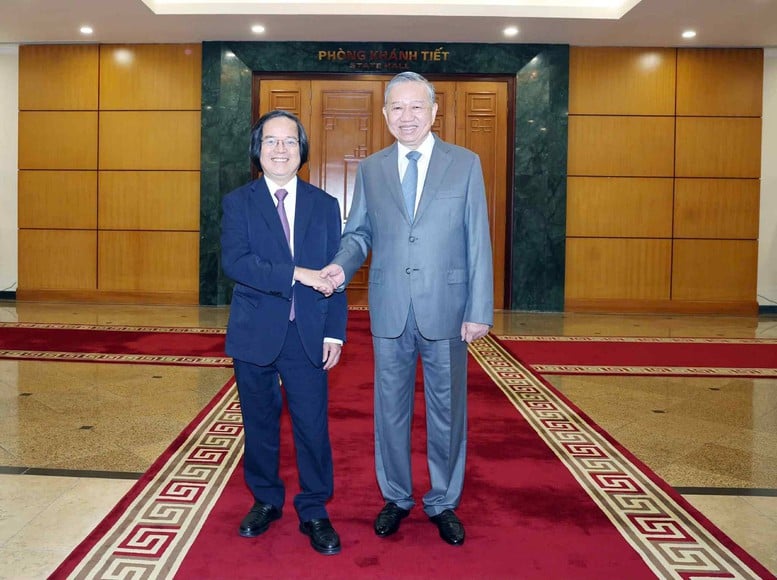
General Secretary To Lam and Professor Tran Van Tho
It takes many big businesses to succeed.
Expressing his interest in the private economic sector, Prof. Tran Van Tho highly appreciated the Government's determination to reform and efforts in developing this sector. For the private economy to develop strongly in the spirit of Resolution 68 of the Politburo, there must be appropriate policies for all types of enterprises and stem from the nature of the current development stage of a deeply integrated economy.
"To reform, referring to the experiences of Japan, South Korea and China, I recommend dividing the private economic sector into three groups and having appropriate policies," said Professor Tran Van Tho.
Regarding the group of large enterprises, create a mechanism for them to share with the State the long-term vision of the future economy, together with the State to carry out basic technology research projects, and through tax policies to encourage them to invest more in research and development (R&D), technology transfer, and management knowledge in association with small and medium enterprises (SMEs).
"Regarding the SME group, referring to Japan's experience, I suggest that state management agencies as well as banks need to have additional functions of consulting SMEs to improve investment projects, have a system of granting certificates to SME consultants,... In addition, central management agencies need to have the function of investigating and researching markets and technologies, and new policies to provide SMEs with quarterly newsletters, and issue the SME White Book annually.
Regarding the group of individual business households and family units, collectively called the informal group, Professor Tran Van Tho recommends that measures be taken to transform the majority of this sector into enterprises, into SMEs. They are small units without human resources, so they need to be supported and given maximum conditions regarding administrative procedures during this transformation process.
Regarding enterprises in general, the policy's goal is to help large enterprises grow stronger, help SMEs develop into large enterprises, and micro-enterprises and individual units transform into SMEs. In the development stage from middle income towards high income, there must be many large enterprises to easily succeed. At this stage, investment projects are getting bigger, the need to research and apply new technologies is increasing with high risks that only large enterprises can withstand.
Professor Tran Van Tho believes that there should be policies to promote business connections. Connecting SMEs with large enterprises in the private and state economic sectors, and with foreign-invested enterprises (FDI). The connection helps transfer technology and management knowledge from large enterprises and FDI to SMEs and helps SMEs overcome market failures in the development process.
"Regarding the investment to GDP ratio, in Vietnam in recent years it has been around 31-32%. I propose to increase it to around 35-36% and private enterprises will account for around 65% of total investment (currently around 55%)."
In short, looking at the success of Japan and other developed economies, Professor Tran Van Tho affirmed that the key lesson for Vietnam is to develop based on productivity, institutional reform and improve the private economic sector. If taking advantage of the right opportunities in the new era, Vietnam will grow strongly, develop in harmony with society and the environment - for the life and happiness of more than 100 million people.
Dieu Huong
Source: https://baochinhphu.vn/giao-su-tran-van-tho-viet-nam-co-the-tang-truong-2-con-so-102251027205348649.htm


![[Photo] National Assembly Chairman Tran Thanh Man received a delegation of the Social Democratic Party of Germany](https://vphoto.vietnam.vn/thumb/1200x675/vietnam/resource/IMAGE/2025/10/28/1761652150406_ndo_br_cover-3345-jpg.webp)



![[Photo] Flooding on the right side of the gate, entrance to Hue Citadel](https://vphoto.vietnam.vn/thumb/1200x675/vietnam/resource/IMAGE/2025/10/28/1761660788143_ndo_br_gen-h-z7165069467254-74c71c36d0cb396744b678cec80552f0-2-jpg.webp)
![[Photo] Draft documents of the 14th Party Congress reach people at the Commune Cultural Post Offices](https://vphoto.vietnam.vn/thumb/1200x675/vietnam/resource/IMAGE/2025/10/28/1761642182616_du-thao-tai-tinh-hung-yen-4070-5235-jpg.webp)



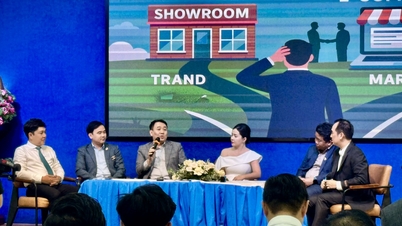

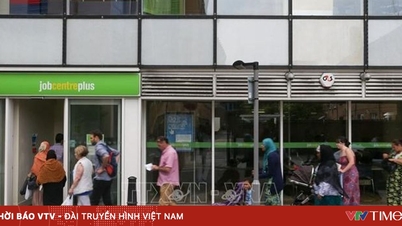

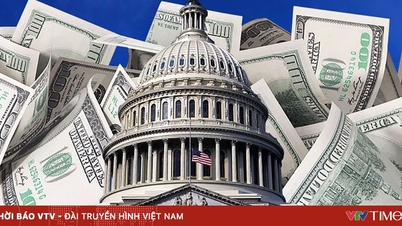






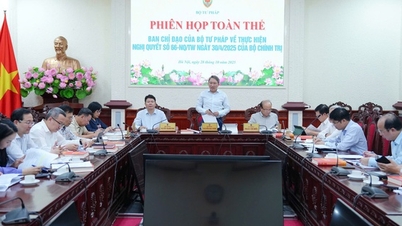

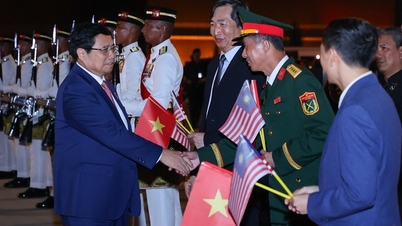
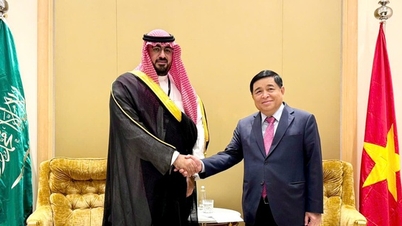

![[Photo] President Luong Cuong attends the 80th Anniversary of the Traditional Day of the Armed Forces of Military Region 3](https://vphoto.vietnam.vn/thumb/1200x675/vietnam/resource/IMAGE/2025/10/28/1761635584312_ndo_br_1-jpg.webp)


































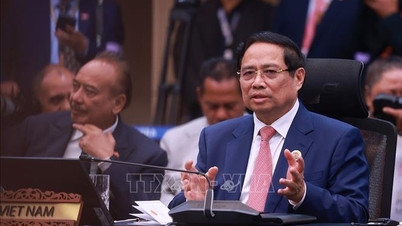

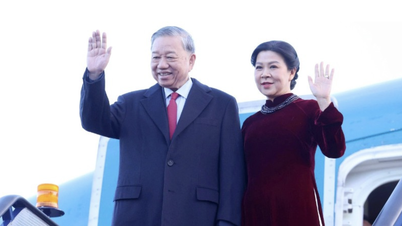






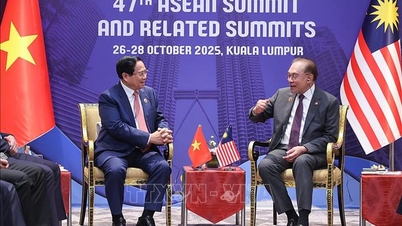
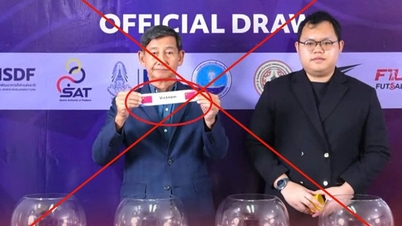

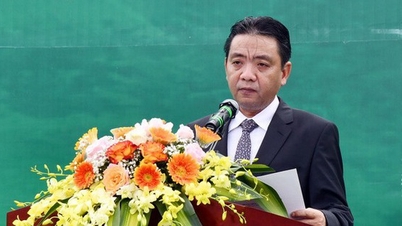
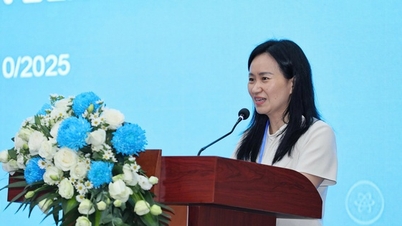

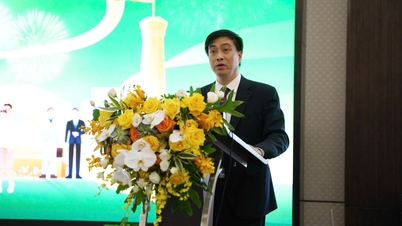


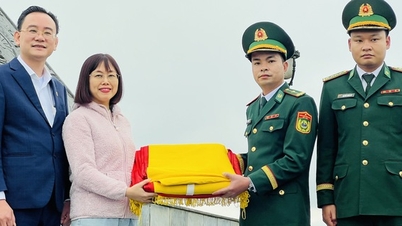
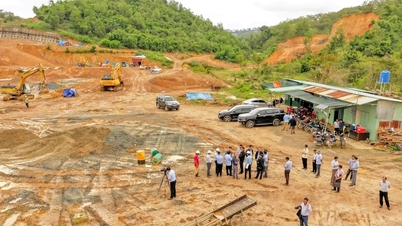





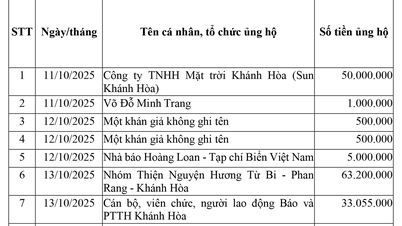

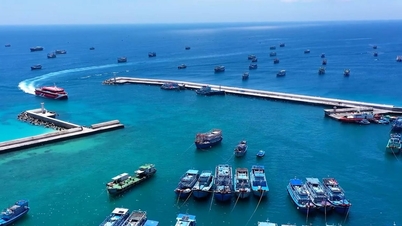

















Comment (0)